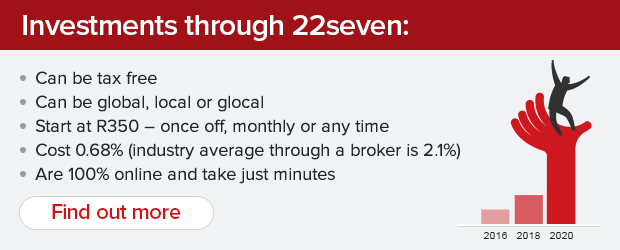Through the Show Your Money Who’s Boss campaign we have demonstrated how to find the invisible money in your monthly expenses and how to use that money to pay off debt.
Being debt-free is the first step in taking control of your finances, but the real objective is to create long-term wealth through investing. A couple of weeks ago I looked at the implications between paying off your mortgage or investing your extra cash and the figures showed that at current interest rates and investment returns, over a 20-year period there is a strong case for investing.
This week, 22seven added to its range of low-cost Tax-Free Savings Accounts allowing investors to invest offshore for as little as R350 a month. 22seven currently offers two low cost investment options which can be used for tax-free savings namely the Old Mutual Core Diversified Fund and the Old Mutual Top 40 Fund with no upfront fee and an annual cost of only 0.68% a year.
Their new offering, the Old Mutual Global FTSE RAFI ® All World Index Feeder Fund, allows you to invest 100% of your funds into a pure offshore fund with exposure to 3000 international companies for the same annual cost of 0.68% per annum. The fund is available both as a regular investment and as a tax-free savings account.
These figures, however, only work if you do not have to pay investment tax, which is a real wealth killer. In the process of creating wealth we pay tax on interest, dividends and capital gains. You start to pay capital gains tax on any capital gain in excess of R40 000.
To put that into perspective, if you saved just R1000 a month in a fund that grew at 10% a year your investment would be worth R207 000, of which R87 000 would be capital gain. That means for even a relatively small monthly investment you would be liable for capital gains tax on R47 000 (R87 000 less R40 000 tax exemption). The more you invest, the more tax you pay. Tax erodes personal wealth, so the first thing you need to do is to save as tax-efficiently as possible.
Investing in your company retirement fund or a retirement annuity is very tax-efficient way to save but these funds are then ear-marked for retirement and in the case of a retirement annuity can only be accessed at the age of 55. One also then has to invest the funds for retirement income. This is a great strategy for your retirement, but it doesn’t offer a solution for more flexible savings.
Fortunately, in March 2015 the government allowed for the creation of tax-free savings/investment accounts where no tax is paid on the investment – this means no tax on interest, dividends or capital gains. Depending on your tax rate over a 20-year period you save about 36% in tax.
For example, if you saved R2500 a month (the maximum allowed in a tax-free savings account) for 20 years with a growth rate of 10% a year, it would be worth about R1.9 million. However, due to taxes, an individual in the top tax bracket would only receive a final payment of R1.4 million. By investing in a tax-free investment account that individual would effectively have saved R500 000 in tax.
Just a little each month goes a long way
Most investment houses offer tax-free savings accounts with a relatively affordable monthly debit order which is perfect for that extra money you now have to put aside. A relatively small debit order can, over time, become a significant amount of money. For example, a monthly debit order of just R500 (less than the cost of meal out with the family) paid over 10 years will be worth more than R100 000 if the investment grows at just 10% a year, thanks to the power of compounding growth.
Investing by debit order is also a very powerful risk management tool. With a lump sum investment in units/shares, the timing of entering the market has a significant impact on the investment return.
Our emotions increase the chance that we will invest at the wrong time: we tend to buy high and sell low as we get caught up in the emotions of investing. By investing with a monthly debit order we are protected from the risk of bad timing because we buy both when the market is up and when it is down. This kind of “phased-in” investing is known as rand-cost averaging, because it helps to average out the return on your investment. You buy more units/shares when prices are low, and fewer units when prices are high, which reduces the overall price you paid for the total number of units in your account.
Show Your Money Who’s Boss and open that tax-free account today – just make sure the debit order goes off before you start spending the money!
The Show Your Money Who's Boss campaign in collaboration with 22seven, Maya Fisher-French and City Press is in its fifth week now. Throughout the campaign we have discussed what the 22seven app does, what the security features are, how to take full advantage of your spending and tips on debt management.
Sign up and download the app here
Have you used the 22seven app?
SMS us at 35697 using the keyword “22seven”(SMS costs R1.50) or email us at personalfinance@citypress.co.za
By participating, you give permission to take part in marketing opportunities




 Publications
Publications
 Partners
Partners










